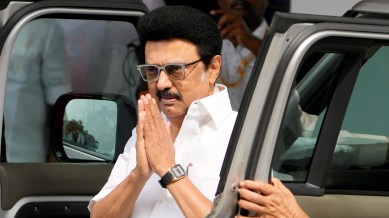Stay updated with the latest - Click here to follow us on Instagram
‘1971 Census should be basis for next 30 years’: Highlights from M K Stalin’s all-party meet on delimitation
While the BJP, Tamil nationalist Naam Tamilar Katchi (NTK) and former union minister GK Vasan's Tamil Maanila Congress (Moopanar) boycotted the meeting, principal opposition party in Tamil Nadu AIADMK, the Congress and Left parties, actor-politician Vijay's TVK took part in it.

Tamil Nadu Chief Minister M K Stalin Wednesday intensified his opposition to a proposed delimitation exercise by the Central government. Asserting that the 1971 Census should remain the basis for allocating seats in the Lok Sabha, Stalin led a pushback against what he perceives as a move that could diminish representation for southern states like Tamil Nadu.
At the heart of Stalin’s objection is a concern that the next delimitation, which adjusts parliamentary constituencies based on population changes, will penalise Tamil Nadu and other southern states for successfully implementing population control measures. Tamil Nadu has long championed policies that limit population growth, policies Stalin now believes could come back to haunt the state as northern states, where population growth remains high, stand to gain more representation.
monthly limit of free stories.
with an Express account.
Speaking at an all-party meeting in Chennai, Stalin proposed the formation of a Joint Action Committee comprising members of Parliament and representatives from southern states to coordinate a unified response to the delimitation exercise. Further Stalin said the exercise should be based on the 1971 Census for the next 30 years.
The meeting, attended by key political parties such as the AIADMK, the Congress, and the Left, saw broad agreement on opposing the delimitation process. However, not all political forces aligned with Stalin’s cause. The BJP, Tamil nationalist party Naam Tamilar Katchi (NTK), and Tamil Maanila Congress, led by former union minister G K Vasan, chose to boycott the meeting.
Stalin’s warning
For Stalin, the delimitation issue has become a rallying cry for what he sees as systemic injustice toward the southern states. “Tamil Nadu paid attention to population control and succeeded, and that was the reason for the state’s plight today,” Stalin said, referencing how his state’s population policies, once praised, are now potentially costing the state parliamentary representation. A few days earlier, Stalin had taken the unusual step of encouraging young couples to have children “immediately” after marriage, warning that the state’s declining birth rate could have political consequences.
“I will not tell you to not have children hastily,” Stalin remarked during a public event, “but have children immediately; and give them beautiful Tamil names.”
In a video message, Stalin had said, “Our demand is clear — don’t determine parliamentary constituencies based on population alone. Do not penalise the Southern states that took responsible measures to control population growth,”
The current delimitation exercise, which redraws the boundaries of parliamentary constituencies based on population data, would likely reduce the number of seats allocated to Tamil Nadu and other southern states with low birth rates, while states with larger populations, predominantly in the north, could gain seats.
The role of the 1971 Census
The upcoming delimitation exercise has triggered a national debate about how political power is distributed between India’s north and south. The issue is rooted in the Constitution, which mandates that the allocation of Lok Sabha seats to each state must be adjusted based on population changes following each Census. Since 1951, this decadal exercise has been conducted regularly, but the delimitation process has been frozen at various times to allow southern states to reap the rewards of their population control efforts.
The freeze was first put in place in 1976, and since then, the 1971 Census has been used as the basis for determining the allocation of seats. The freeze is set to expire after 2026, and many political observers believe that once it is lifted, states with higher populations — like Uttar Pradesh, Bihar, and Rajasthan — will gain a larger share of parliamentary seats.
Stalin and other leaders argue that the 1971 Census should remain the baseline, fearing that a shift to a more recent population count could severely reduce the political influence of their states. While Tamil Nadu has taken the lead in voicing this opposition, other southern states, including Kerala, Karnataka, and Andhra Pradesh, share similar concerns.
What has the BJP said?
The BJP has largely downplayed concerns from the southern states, with Union Home Minister Amit Shah recently assuring leaders that “not a single seat” would be lost as a result of the exercise.
What is delimitation?
The constitutionally mandated exercise-delimitation is the process of drawing boundaries of constituencies for elected bodies based on the population in the most recent Census. According to Article 82 of the Constitution, the allocation of Lok Sabha seats to each state must be adjusted based on population changes after every Census.
The decadal exercise has been going on every year since 1951. However, in 2021, the Census was put off amid the Covid crisis. Since then, the Census has been consistently put off.